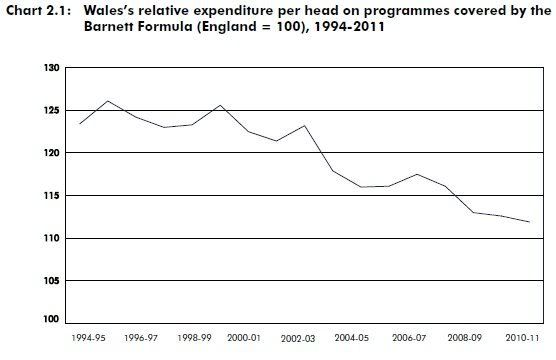Peter Hain did one of the things he does best in the Welsh Leaders debate on ITV last night: repeating the same lie over and over again in the belief that repeating it will make it true. The subject was replacing the Barnett Formula with a fairer way of funding Wales, using the sort of needs-based criteria by which departments allocate funding to the regions of England.
A wiser person might have thought twice before opening his mouth, especially when each of the other parties agree that the current system is unfair and needs to be replaced. But not Peter Hain. No, he wants us to believe that he has already sorted out the problem and secured fair funding for Wales.
Hain has secured no such thing. His vanity has got the better of him yet again. He can't bring himself to say that he tried to do this, but failed. So he must instead make out that his failure to do it was in fact a success.
Peter Hain's problem is that he has no idea how to fight for Wales at the Cabinet table. The Treasury have been able to run rings around him and, as a direct result, Wales has got far less of an increase in public spending than either Scotland or England. This graph, from the Holtham Commission's first report, shows just how much Wales' share of spending has declined relative the amount of money Labour has spent in England in the thirteen years they have been in power at Westminster.

Peter Hain did respond to this by going to the Treasury to ask for Wales to be fairly treated. But the Treasury ran rings around him again. In the debate he claimed that he had negotiated "a detailed reform of the Barnett Formula". But he's deluding himself and trying to mislead the rest of us. This is the final agreement in its entirety. It includes absolutely no figures or detail at all:
The Government welcomes many aspects of the Holtham report, which it continues to study in detail.
The new arrangements are as follows:
• the Government agrees that the Barnett formula could lead to convergence to an extent that would be regarded as unacceptable although further convergence is not currently expected in the coming years;
• the Government will make a full assessment of the extent of convergence with consideration of Wales' position relative to other parts of the United Kingdom as part of each spending review; and
• following this assessment the Government would be prepared to take action if appropriate to ensure Wales is not disproportionately disadvantaged.
All of us can clearly see that this is only an agreement that the Treasury will assess the situation in future. Consider the three things I highlighted:
Regarded as unacceptable
To whom? The Treasury and the Wales Office obviously both regard it as acceptable for Wales' share of spending relative to England to have dropped from 125% to 113% in the thirteen years Labour have been in power. So at what point would it become "unacceptable"? So far as most people in Wales are concerned, it was surely unacceptable for there to have been any fall at all. So far as Plaid are concerned, the point of unacceptability has already been reached, because Holtham has confirmed that the absolute bottom line correction figure that should be applied to the existing Barnett Formula is 114%.
If appropriate
But why the "if"? If Peter Hain had won a firm agreement from the Treasury, there would be no "if" about it. This agreement leaves the matter entirely at the discretion of the Treasury. What if the Treasury thought there were circumstances that made it inappropriate to treat Wales as a special case ... for example, because public borrowing is out of hand and they think the UK can therefore not afford it?
Disproportionately disadvantaged
We can all see that Peter Hain conveniently misquotes this part of the agreement. This is not the same as the "disadvantaged" he now keeps quoting. Wales has already been systematically disadvantaged over the last 13 years. This agreement would allow that to continue, and could easily be taken to mean only that the Treasury would do something if the rate at which we have been disadvantaged over the past 13 years—about 1% per year relative to England—were to accelerate to more than 1% a year.
-
In other words the agreement does not deliver what Peter Hain claims it delivers. But he simply appears too stupid to understand that. He very obviously doesn't know enough about the subject to understand that the Treasury has made a fool out of him. This is most clearly illustrated by the fact that the Welsh Labour Manifesto makes the ridiculous claim that the Barnett Formula is already based on need ... it is simply not true.
Peter Hain is a liability to Wales. He has already cost Wales huge amounts of money, money that we would have secured if we had someone who knew how to fight Wales' corner. But the rest of Wales' Labour MPs aren't much better. They could have kicked up a fuss about it, but instead they just kept schtum; in part cowed by the Treasury, in part in the hope that the subject would be too complicated for the average person to understand.
-
Finally, it is encouraging that both the Tories and the LibDems want the Barnett Formula to be replaced with a "fair" needs-based formula. That's all well and good, but what does "fair" actually mean to them? Neither of them will say.
It is only Plaid that has put a figure on it, based on what the Holtham Commission has recommended. We are the only party that is prepared to put hard numbers against the shortfall ... 300 million reasons to vote Plaid.

I've written about the Holtham Commission and its report in a number of posts on Syniadau. Please click here to bring them up.


0 comments:
Post a Comment